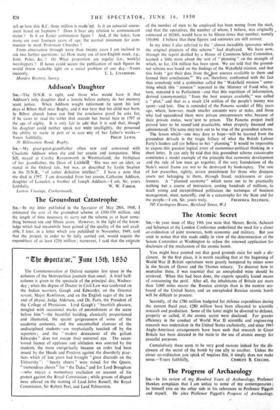The Groundnut Catastrophe_ SIR, —In my letter published in the Spectator
of May 28th, 1948, I estimated the cost of the groundnut scheme at £100-150 million, and the length of time necessary to carry out the scheme as at least some- thing between ten and fifteen years. However, in the light of the know- ledge which had meanwhile been gained pf the quality of the soil avail- able, I later, in a letter which you pub,aed in November, 1949, said that the project, in order to be fully carried out, would require the expenditure of at least £250 million ; moreover, I said that the estimate
of the number of men to be employed has been wrong from the start, and that the operatives, the number of whom, I believe, was originally estimated at 10,000, would, have to be fifteen times that number, namely 150,000. 1 believe that these figures and estimates are still correct.
In my letter I also referred to the "almost incredible ignorance which the original planners of this scheme " had displayed. We have now, through the report drafted by a House of Commons Select Committee, learned a little more about the sort of " planning " on the strength of which, so far, £34 million has been spent. We are told that the ground- nut scheme was based on the findings of the Wakefield mission, and that this body " got their data from thealrst sources available to them and formed their conclusions.": We are, therefore, confronted with the fact that somebody told a committee called the " Wakefield mission" some- thing which this " mission " repeated to the Minister of Food who, in turn, repeated it to Parliament—and that this -repetition of information, derived (anonymously) " from the best sources available," was called a " plan," and that as a result £34 million of the people's money was spent—and lost. One is reminded of the Panama scandal of fifty years ago, where, however, much smaller amounts were at stake, and those who had squandered them were private entrepreneurs who, because of their private status, werel'sent to prison. The Panama project itself prOved later to be sound andpracticable, when properly financed and administered. The same may turn out to be true of the groundnut scheme.
The lessor' which—one may dare to hope—will be learned from the groundnut debacle is the tragic fallacy of what the British Labour Party's leaders call (or believe to be) " planning." It would be impossible to expose this greatest logical error of economico-political thinking is a short letter. It can only be said that this groundnut scheme catastrophe constitutes a model example of the principle that economic development and the rule of law must go together, if the very foundations of the State's social frame are not to be destroyed by bankruptcy. The rule of law prescribes, rightly; severe punishment for those who dissipate assets not belonging to them, through fraud, recklessness or care- lessness. A " planned economy" which turns out to be practically nothing but a course of instruction, costing hundreds of millions, to teach young and inexperienced politicians the technique of business management, must, naturally, end in a catastrophe for the State and for
the people.—I am, Sir, yours truly, FREDERICK JELLINECK. 705 Carrington House, Hertford Street, W.1




































 Previous page
Previous page